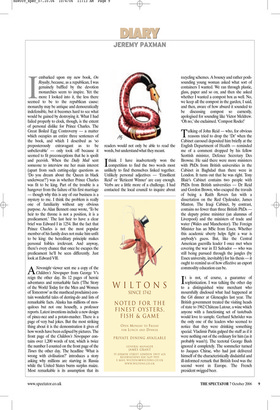I embarked upon my new book, On Royalty , because, as a
republican, I was genuinely baffled by the devotion monarchies seem to inspire. Yet the more I looked into it, the less there seemed to be to the republican cause: monarchy may be antique and democratically indefensible, but it becomes hard to see what would be gained by destroying it. What I had failed properly to clock, though, is the extent of personal dislike for Prince Charles. The Great Boiled Egg Controversy — a matter which occupies an entire three sentences of the book, and which I described as ‘so preposterously extravagant as to be unbelievable’ — only took off because it seemed to fit preconceptions that he is spoilt and peevish. When the Daily Mail sent someone to interview me her main interest (apart from such cutting-edge questions as ‘Do you dream about the Queen in black underwear?’) was in whether Prince Charles was fit to be king. Part of the trouble is a hangover from the failure of his first marriage — though why this is any of our business is a mystery to me. I think the problem is really one of familiarity without any obvious purpose. As Alan Bennett once wrote, ‘To be heir to the throne is not a position, it is a predicament.’ The last heir to have a clear brief was Edward I in 1254. But the fact that Prince Charles is not the most popular member of his family does not make him unfit to be king: the hereditary principle makes personal foibles irrelevant. And anyway, there’s every chance that once he escapes the predicament he’ll be seen differently. Just look at Edward VII.
ANewsnight viewer sent me a copy of the Children’s Newspaper from George V’s reign the other day. Its 12 pages of heroic adventures and remarkable facts (‘The Story of the World Today for the Men and Women of Tomorrow’ as the masthead proclaims) contain wonderful tales of derring-do and lists of remarkable facts. Alaska has millions of mosquitoes but not one housefly, a professor reports. Latest inventions include a new design of pince-nez and a potato-masher. There is a page of very bad jokes. But the most striking thing about it is the demonstration it gives of how words have been eclipsed by pictures. The front page of the Children’s Newspaper contains over 1,200 words of text, which is twice the number I counted on the front page of the Times the other day. The headline ‘What is wrong with civilisation?’ introduces a story asking why millions are starving in Russia while the United States burns surplus maize. Most remarkable is its assumption that its readers would not only be able to read the words, but understand what they meant.
Ithink I have inadvertently won the competition to find the two words most unlikely to find themselves linked together. Unlikely personal adjectives — ‘Emollient Reid’ or ‘Reticent Winner’ are easy enough. Verbs are a little more of a challenge. I had contacted the local council to inquire about recycling schemes. A bouncy and rather poshsounding young woman asked what sort of containers I wanted. We ran through plastic, glass, paper and so on, and then she asked whether I wanted a compost box as well. No, we keep all the compost in the garden, I said, and then, aware of how absurd it sounded to be discussing compost so earnestly, apologised for sounding like Victor Meldrew. ‘Oh no,’ she exclaimed. ‘Compost Rocks!’ Talking of John Reid — who, for obvious reasons tried to drop the ‘Dr’ when the Cabinet carousel deposited him briefly at the English Department of Health — reminded me of a comment dropped by his fellow Scottish minister, Defence Secretary Des Browne. He said there were more ministers with PhDs from British universities in the Cabinet in Baghdad than there were in London. It turns out that he was right. Tony Blair’s Cabinet contains two people with PhDs from British universities — Dr Reid and Gordon Brown, who escaped the travails of being a Raith Rovers fan with a dissertation on the Red Clydesider, James Maxton. The Iraqi Cabinet, by contrast, contains no fewer than three British PhDs the deputy prime minister (an alumnus of Liverpool) and the ministers of trade and water (Wales and Manchester). The Foreign Minister has an MSc from Essex. Whether this academic uberty helps fight a war is anybody’s guess. But, like the Central American guerrilla leader I once met when covering the war in El Salvador — who was still being pursued through the jungles (by Essex university, inevitably) for his thesis — it ought to remind us of how effective an export commodity education can be.
It is not, of course, a guarantee of sophistication. I was talking the other day to a distinguished wine merchant who mournfully disclosed what had happened at the G8 dinner at Gleneagles last year. The British government treated the visiting heads of state to 1962 Château Latour, a wine which anyone with a functioning set of tastebuds would love to sample. Gerhard Schröder was the only one of the leaders who seemed to notice that they were drinking something special. Vladimir Putin gulped the stuff as if it were nothing out of the ordinary for him (as it probably wasn’t). The teetotal George Bush ignored it completely. The sommelier turned to Jacques Chirac, who had just delivered himself of the characteristically disdainful and ill-informed remark that British food was the second worst in Europe. The French president swigged beer.


















































































 Previous page
Previous page